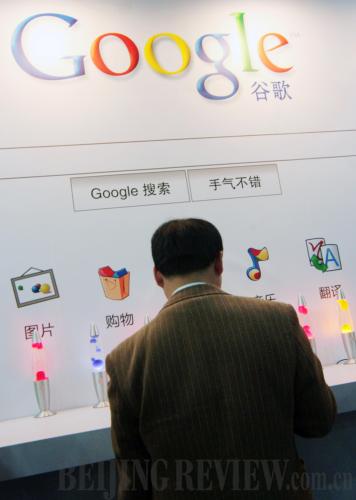|
 |
| ALL KNOWING: A man tries Google's search engine at an exhibition in Beijing on November 3 (CFP) |
The sudden fame of Zhang Hongbo, Deputy Executive Director of the China Written Works Copyright Society (CWWCS), started when his organization began probing into Google Book Search's alleged infringement on Chinese copyright holders. The non-governmental organization, which represents Chinese writers on copyright issues, released a statement on September 1, claiming that its survey found that Google Book Search had scanned at least 17,922 Chinese books that are under copyright protection without seeking permission from 570 authors.
Since then, he has been interviewed repeatedly by major national news organizations and has been receiving calls from famous writers who have entrusted his agency to negotiate with Google for compensation. He has also been traveling frequently to other cities in China, where he advocates for local writers to join his organization, or to at least entrust it to negotiate with Internet company.
"The more rights holders I represent, the more leverage I will have during talks with Google," Zhang told Beijing Review on November 13.
On October 16, CWWCS posted a letter on the Chinese Writers' Association website, calling on copyright holders to talk with Google through writers' and publishers' associations. Zhang said that by November 13 over 700 Chinese authors had entrusted his agency to negotiate with Google.
While Zhang prepared his legal battle with Google, the Internet company was busy ironing out a class action lawsuit settlement with American authors and publishers. According to the settlement, whose latest version was filed on November 13, authors and publishers accusing Google of violating their copyrights by scanning their books, creating an electronic database and displaying short excerpts without the permission of copyright holders, will get a one-time payment of $60 per scanned out-of-print book (or $5 to $15 for partial works). In return, Google will be able to index the books and display snippets in search results, as well as up to 20 percent of each book in preview mode. Authors and copyright holders will receive 63 percent of all advertising and e-commerce revenues associated with their works.
But the settlement does not apply to Chinese authors and rights holders whose works have been scanned by Google into its digital index.
"Even if Google offered to apply these compensation terms to scanned Chinese books, we would not have accepted them," said Zhang, who met with Eric Hartmann, the Asia-Pacific head of Google Books, on November 2.
A meeting memo kept by CWWCS shows that Google admitted it had scanned books under Chinese copyright for its online library in numbers much larger than the figure announced by CWWCS. The company denied any copyright violations.
Google launched its Book Search interface in the Chinese language in March 2007 and announced on October 9, 2009 that the service contained over 10 million scanned books. On October 22, Hartmann wrote on googlechinablog.com that 50 Chinese publishers had joined Google's library project partner program. They authorized Google to provide previews of up to 20 percent of the content of 600,000 books.
| 